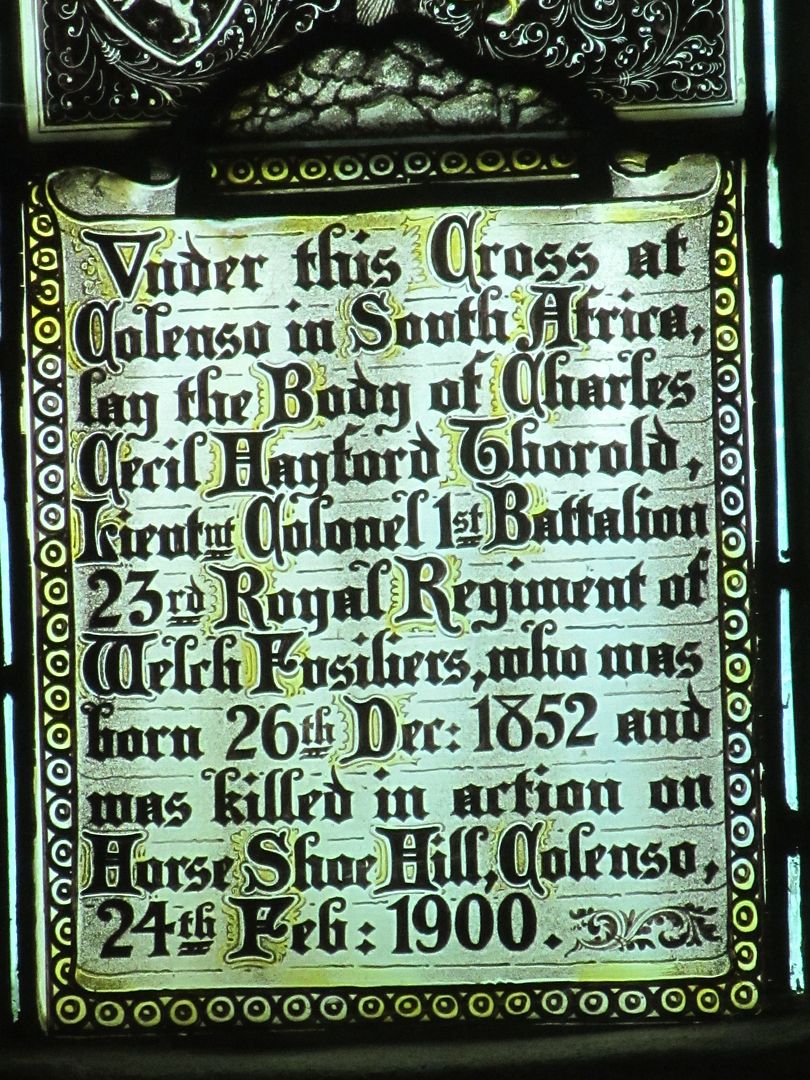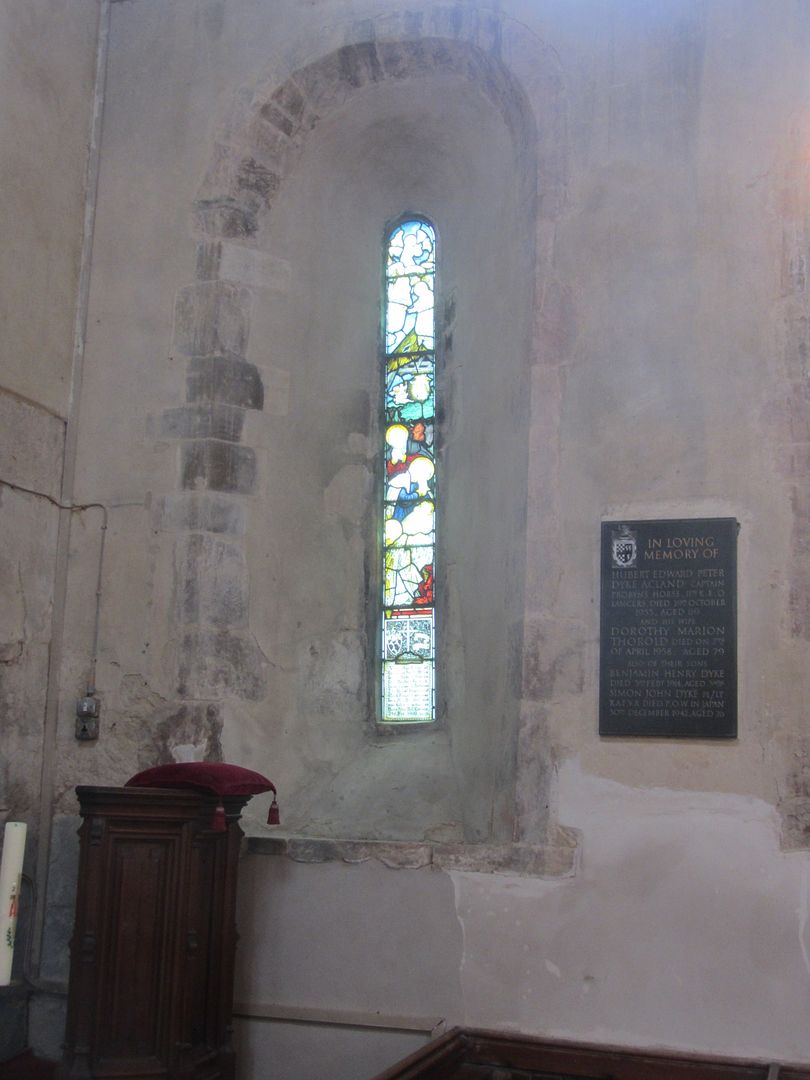In St Mary's Church, Syston, Lincolnshire.
Under this Cross at Colenso in South Africa, lay the body of Charles Cecil Hayford Thorold, Lieut
nt
Colonel 1st Battalion 23rd Royal Regiment of Welch Fusiliers, who was born 26th Dec. 1852 and was killed in action on Horse Shoe Hill, Colenso, 24th Feb. 1900.
L
IEUTENANT
-C
OLONEL
C
HARLES
C
ECIL
H
AYFORD
T
HOROLD
, commanding 1st Battalion Royal Welsh Fusiliers, who was killed in action in Natal on the 24th inst., entered the Army through the Militia in 1874. From 1882 to 1887 he served as battalion adjutant, and from 1887 to 1892 as an adjutant of Volunteers. He was promoted to the command of the 1st Battalion Royal Welsh Fusiliers in 1896. Colonel Thorold was in his 48th year.
The Times, Tuesday 27th February 1900
_______________________
It is only about two months ago that poor Lieutenant-colonel Thorold, of the Welsh Fusiliers, passed through Cardiff on his way to the front. One of our representatives, who went to the station to see the regiment going through, had a chat with Colonel Thorold, and was struck with his depression of spirits. That was the time when officers were falling at the front in numbers out of all proportion to the rank and file. Our man wished the colonel good luck and a safe return. The gallant soldier smiled absently. "Thank you," he said, "but there is no certainty about returning." It will not be forgotten in Wales that he fell on the way to relieve Ladysmith.
The Western Mail, Tuesday 27th February 1900
_______________________
THE LATE LIEUT.-COLONEL C. C. H. THOROLD.
A gloom was cast over the Borough of Wrexham and neighbourhood when the news was received of heavy casualties to officers and men of the Royal Welsh Fusiliers, and it was with very deep regret that the name of Lieut.-Colonel Charles Cecil Hayford Thorold, commanding the 1st Battalion Royal Welsh Fusiliers, was noticed amongst those killed. Col. Thorold was an officer about whom it would be impossible to say anything but words of the highest praise. He was a thorough soldier, and a strict disciplinarian, but for all that, he was beloved by the officers of his staff, the non-commissioned officers, and men of the Royal Welsh. He was a man who took a deep interest in his calling, and it was by sheer merit that he regularly rose from one position to another, showing that he was giving loyal and honourable service. Col. Thorold belonged to Henley-on-Thames, and at the time of his death he was 47 years of age. He joined the 2nd 23rd through the militia, as lieutenant on the 13th of June, 1874, just after the men came home from Ashantee, and in October of the same year he went with them to Gibraltar for garrison duty. The regiment remained there for five years, and he returned to Plymouth with them in February, 1880. In August, 1881, he was appointed instructor of musketry at Plymouth and Pembroke Dock, and he held that office until the 24th October, 1882. He was created captain on the 25th October, 1882, and from the 25th October, 1882, to the 14th September, 1887, he acted as adjutant of the 2nd Battalion, after which he served as adjutant of the 2nd V.B.R.W.F., whose headquarters are at Hawarden. He was created major on the 16th June, 1890, whilst he was elevated to the rank of lieutenant-colonel on the 4th of March, 1896, in succession to Lieutenant Colonel Griffiths, who acted a very short time after Lieutenant Colonel Norman, father of Second Lieutenant C. C. Norman, one of the wounded, relinquished command. Whilst major he was in command of a company at Aldershot for a short time, and he was out in India with his battalion. He left there and proceeded to Aden, from whence the men were ordered home to Devonport. There they were stationed for about twelve months, when they received orders to proceed to South Africa, Colonel Thorold to be in command. They set sail about the end of October last in the transport Oriental, and they have been with the 1st Division ever since. Colonel Thorold and his men have been given their share of work by General Buller, and it is a great pity that the commanding officer should have been struck down just at a time when the Battalion was hoping to add further lustre to its name at the relief of Ladysmith.
The Wrexham Advertiser, Saturday 3rd March 1900
_______________________
.
The Late Lieut. Colonel Thorold.
The commander of the Welsh Fusiliers, Lieut Colonel Thorold, who was killed in action while his regiment was engaged with Sir Redvers Buller's force on Saturday last was at one time the adjutant of the Flintshire and Carnarvonshire Volunteers. He succeeded Major Norman, who lived in Englefield, Rhyl, in 1887. Colonel Thorold - or Captain Thorold, as he was then - was a most popular adjutant both with officers and men; and his death will greatly be deplored by those who had the privilege of serving under him.
The Rhyl Journal, Saturday 3rd March 1900
_______________________
A VOICE AS FROM THE GRAVE
LETTER FROM COL. THOROLD.
OFFERS THANKS FOR THE WELSH FUSILIERS.
There is a pathetic touch about the following letter, which is not derived from its phraseology, kind and thoughtful as it is. The writer has since died upon the field of battle fighting for his country. It is from the late commander of the Welsh Fusiliers, Lieut.- Colonel Thorold, and was received by the Editor of the "Daily Post" on Saturday evening last.
"Chieveley Camp (near Colenso),
"February 3rd, 1900.
"Dear Sir, - A box addressed to my regiment came for me. Outside was, "For Swansea boys at the Front." I found it full of packets of tobacco addressed individually to men in regiments all over South Africa. What I have done is as follows: I was sent six packets only for my battalion, but I have about 70 Swansea boys. I therefore took 32 packets for my lads, dividing it out between the lot. The remaining 68 were all for the Welsh Regiments; these I re-packed and have sent off to them in Cape Colony. I think you will agree that under the circumstances it was the best thing to do, as it would be impossible to send to three men in Cape Mounted Rifles, six in Foot Guards, etc.
"My Swansea boys are most grateful for these presents, and I trust will mention this when they write home. I thank you on their behalf for the kindly interest you take in them.
- Believe me, yours faithfully,
"C. THOROLD, Lieut.-Col.,
"Commanding Royal Welsh Fusiliers."
[The transport officer at Cape Town seems to have made a bungle, as there were express directions for breaking the bulk there and forwarding each parcel separately addressed to its destination. However, all's well that ends well. - Ed.]
The South Wales Daily Post, Monday 5th March 1900
_______________________
A handsome stained-glass window has been placed in the parish church at Syston, near Grantham, to the memory of Lieutenant-Colonel Charles Cecil Hayford Thorold, youngest brother of Sir J. H. Thorold, of Syston Park, by the members of the Thorold family. The window, which was designed by Kemp, of London, fills the narrow lancet window near the pulpit. The subject is the Nativity, and the beauty of the colours harmonises in a most pleasing manner. At the bottom is the family crest and coat-of-arms, and a facsimile of the cross placed over his grave, with the motto, "In hoc signo vinces," and the following inscription: - "Under this cross lies the body of Charles Cecil Hayford Thorold, Lieutenant-Colonel, 2nd Battalion 23rd Royal Regiment of Welsh Fusiliers, who was born December 26th, 1852, and was killed on the Green Hill, near Colenso, Colony of Natal, February 24th, 1900."
The Lincoln, Rutland, and Stamford Mercury, Friday 13th September 1901 












